- UMA-JIRUSHI
- See Daimyo flags 1) and its following notes.
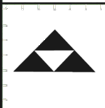
Uma Jirushi/Personal Flag of Houjou Ujiyasu 1516–1571, Japan
- UNCASE(D)
- 1) (v) To remove a regimental, unit, service or national colour (or occasionally a parade flag),
usually with the appropriate ceremony, from its protective case (see also
‘case(d)’ and ‘dislodging’).
2) (adj) The term used when a regimental, unit or national colour (or occasionally a
parade flag) has been removed from its case (see also
‘parade flag 2)’ and ‘unfurl(ed)’).
- UNDEFACED
- (adj) The term used to describe a flag which may (and sometimes does)
carry authorized additions, but in this case is seen without any such
additions – see defaced (also blue ensign, red ensign
and template flag).
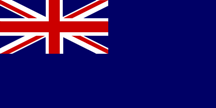
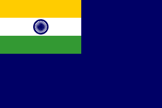
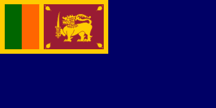
Reserve Ensign, UK; Reserve Ensign,
India; Reserve Ensign,
Sri Lanka
- UNDULATING
- In heraldry see wavy.

Flag of Amur, Russia
- UNDY (or UNDE)
- Alternative heraldic terms for wavy – see ‘wavy’ (also ‘nebuly’).
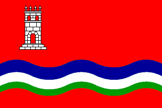
Flag of L’Aldea, Spain
- UNEQUAL BICOLOUR (or UNEVEN BICOLOUR)
- Alternative terms that may be used when a bicolour is composed of stripes whose widths are not equal – but see ‘bicolor 1)’.
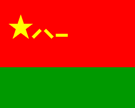
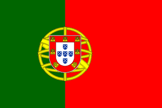
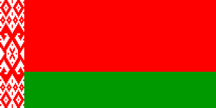
Ground Forces Flag, China;
National Flag of Portugal; National Flag of
Belarus
- UNEQUAL TRIBAND (or UNEVEN TRIBAND)
- Alternative terms that may be used when a triband is composed of stripes whose widths are not equal – but see
the note below and ‘triband 1)’ with its following note b) (also ‘Canadian pale’,
‘Spanish-style triband’
and ‘unequal tricolor’ below).
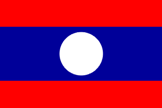
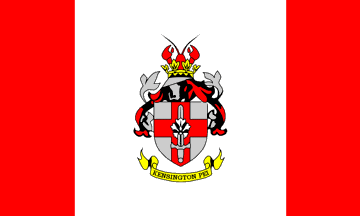
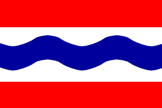
National Flag of Laos;
Flag of Kensington, Canada;
Flag of Albrechtice nad Orlicí, Czechia
Please note that a triband having a single stripe which is narrower than one-third of its width (as on
that of the Armenian SSR illustrated below) may also (and perhaps should) be considered as a plain flag bearing such a stripe.
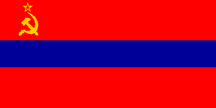
Flag of the Armenian SSR 1952–1991
- UNEQUAL TRICOLOUR (or UNEVEN TRICOLOUR)
- Alternative terms that may be used when a tricolour is composed of stripes whose widths are not equal – but see
‘tricolour 1)’ and its note c) following (also ‘unequal triband’
above).
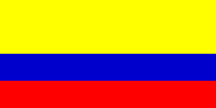
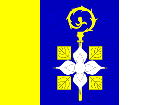
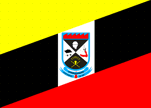
Civil Flag of Ecuador;
Flag of Albrechtičky, Czech Republic;
Flag of Charqueadas, Brazil
- UNFURL(ED)
- 1) (v & adj) Generically, to hoist, break out or show (or to have hoisted, broken out or shown) a flag (or flags) that have not been
displayed until that moment (see also ‘break a flag’ and
‘hoist 3)’).
- 2) (v & adj) To unwind (or to have completed the unwinding of) a colour or parade flag from its staff after it has been uncased
(see also ‘colour 2)’,
‘furl(ed)’,
‘parade flag 2)’ and
‘uncase(d)’).
- UNGULED
- In heraldry a term that covers the nails, claws talons or hoofs of birds/beasts, and is
used only when these are of a different tincture from its body
(see also armed,
armed and langued,
membered and
tincture).
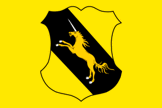
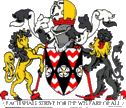
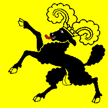
Flag of Saverne, France;
Arms of South Yorkshire County Council, UK;
Flag Schaffhausen, Switzerland
- UNICOLOUR/UNICOLOURED (or UNICOLOUR/UNICOLORED)
- See ‘monocolour’.


National flag of Libya 1977–2011;
Flag of Partido de la Sierra en Tobalina, Spain
- UNICORN
- See ‘heraldic beasts’
![[unicorn]](../images/v/vxt-d4202a.gif)
![[unicorn]](../images/v/vxt-d4202.gif)
Arms and Flag of Nova Bukovica, Croatia
- UNION, THE
- 1) Specifically in US usage, the canton of the US national flag – i.e. 13 –
50 white stars on a blue field (see also ’stars and stripes’,
‘union jack 3)’
and ‘union mark’).
- 2) Generically, see ‘canton 2)’ (also ‘union mark’).
![[Jacks - US]](../images/v/vxt-d337a.gif)
![[Anguilla]](../images/v/vxt-d3370.gif)
Canton of the National Flag/National Jack, US;
National Flag of Anguilla
- UNION FLAG
- 1) Specifically in UK usage, a precise term for the British national flag when flown on
land – but see ‘union jack 1)’ and ‘union jack 2)’ below.
- 2) Generically, the term that may be used when a flag symbolizes the
political or economic union of two or more
previously independent countries – for example those of the United Arab Emirates, Malaysia
(as illustrated below) or
Tanzania (see also ‘union mark’).
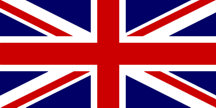
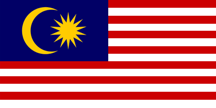
National Flag of the United Kingdom ;
National Flag of Malaysia
- UNION JACK
- 1) A general and officially recognized term for the British national flag
whether flown on land or sea – but see ‘union flag 1)’ and ‘union jack 2)’ (also
(also
‘British flag’,
‘gore‘,
‘great union‘,
‘interlaced’,
‘James union’,
‘national flag’,
St Andrew's Cross 2)’,
St George's Cross 2)’,
St Patrick's Cross’ and
‘union mark’).
- 2) In UK usage, a precise term for the British national flag when flown as a jack from the bows of a British
warship, from a yardarm to signal that a court martial is being held, or at the main masthead
as the command flag of an Admiral of the Fleet – see ‘union flag 1)’ (see also
‘flag of command’, ‘His Majesty’s Jack’,
‘jack’ and ‘naval jack’ under
‘jack’,
‘masthead’
and ‘yardarm’).
- 3) In US usage, the official term for the traditional US national jack, which is the canton from the national flag (see also ‘union, the’).
![[Jacks - United Kingdom]](../images/v/vxt-d3695.gif)
![[Jacks - US]](../images/v/vxt-d3696.gif)
Union Jack 1606–1801, England/UK;
National Jack 1795–1818, US
Notes
a) The British national flag is legally (when undefaced)
restricted to naval vessels whilst flown afloat (see also 'civil jack', 'government
jack' and 'naval jack' under 'jack',
'pilot jack' and
'undefaced').
b) US merchant vessels
are not forbidden by regulation to wear the union jack as described in 3) above, but (as far as can be discovered) they do not do so.
- UNION MARK
- A symbol expressing the unification of two or more countries – such as that of the European
Union or the former Norwegian-Swedish Union Mark – either employed alone or as an additional charge
on a flag (see also ‘charge’,
‘conjoined’,
‘interlaced’,
‘union’, ‘union flag’ and
‘union jack’ above).
![[Norway-Sweden Union Mark]](../images/v/vxt-d341.gif)
![[Norway-Sweden Union Mark]](../images/v/vxt-d948.gif)
![[Norway-Sweden Union Mark]](../images/v/vxt-d4197.gif)
Norway-Sweden Union Mark and Naval Jack 1844–1905;
Flag of the EU;
Royal flag of Sweden 1844–1905
- UNION PENDANT
- 1. See budgee pendant.
2. In English usage now obsolete, a term originally used to also describe what later became the common or
tricolour pendant – see common pendant
(also pendant).
![[Union pendant]](../images/v/vxt-d1052.gif)
The Union/Budgee Pendant c1700, UK
- UNION PENNANT (UNION VIMPEL or WIMPEL)
- 1. In UK usage, the terms employed to describe a trapezoidal pennant with
a union at its hoist and a tricolour fly, which may be flown where a flagpole
would otherwise be unused – a Union wimple or vimpel (see also
‘English pennant’,
‘hoist 1)’,
‘pennant’,
‘Scottish pennant’,
‘trapezoid 2)’,
‘tricolour’,
‘Welsh pennant’ and
‘wimpel 1)’).
![[Union pennant]](../images/v/vxt-d5089.gif)
Union Pennant (Bartram)
- UNION STANDARD
- In British military usage, a term for one of three such standards each carried
by the Life Guards and the Blues and Royals – the Household cavalry – and the
equivalent of a normal cavalry guidon or infantry colour (see also
colour 2),
'colours 2) and
guidon 2) and
sovereign's standard).
![[union standard]](../images/v/vxt-d498.gif)
Reverse of The Union Standard of the Blues and Royals, UK (householdcavalry.info)
Please note that the Blues and Royals (unlike the Life Guards) also carry a guidon
in addition to the sovereign’s and union standards due to their amalgamation with the
Royal Dragoons in 1969.
- UNIQUE FLAG (or UNIQUE EXAMPLE)
- A flag intended in design and usage, to be the only one of its type.
![[Unique Flag]](../images/d/de@dt880o.gif)
Main Banner of German Athletics Union 1880
Please note that in East and Central European usage the ceremonial flag of
a community is often created as a unique flag – see
‘ceremonial flag 2)’.
- UNIT COLOUR (or COLOR)
- See ‘colour 2)’ and
‘colours 2)’.
![[Unit Flag]](../images/v/vxt-d1182.gif)
Unit Colour of the 2nd Army Corps, 2nd Support Brigade, Greece
- UNIT DESIGNATION
- The inscription on a colour that indicates the military group to which it
belongs (see also ‘colour 2)’.
![[Unit Designation]](../images/v/vxt-d2367.gif)
Colour of the 103rd Field Artillery with Unit Designation, US
- UNIT FLAG
- 1) See ‘camp flag’.
- 2) See ‘branch of service flag 2)’.
![[Unit Colour]](../images/v/vxt-d1466.gif)
![[Unit Colour]](../images/v/vxt-d1467.gif)
Unit/Camp Flag of The Royal Army Medical Corps, UK (Graham Bartram); Unit/Branch of Service Flag of
The Transportation Service, US
- UNOFFICIAL FLAG
- A flag that has (or had) not been formally adopted by the relevant authority, but is (or has
been) sold commercially, or exhibited by supporters or enthusiasts as representing a particular entity, institution or
cause, as opposed to a design or type which is so authorized or for which there is (or has been)
– see ‘official flag 1)’
(also ‘de facto 2)’,
‘folk flag’ and
‘institutional flags (unofficial)’.
![[unofficial flag]](../images/v/vxt-d3809.gif)
![[unofficial flag]](../images/v/vxt-d5241.gif)
![[unofficial flag]](../images/v/vxt-d5242.gif)
Unofficial Flag of Palmyra Atoll, US;
Unofficial Flag of Da Nang City, Vietnam;
Unofficial Flag of the Sami People, Norway
- UNREP (UNDERWAY REPLENISHMENT) FLAG
- See ‘battle flag 2)’.
![[unrep flag]](../images/v/vxt-d1123.gif)
Unofficial Flag of USS Elliot (Sea
Flags)
- UPPER FLY (or UPPER FLY CANTON)
- In vexillology alternative terms for that quarter of a flag which occupies the upper fly –
the second canton or quarter, or the upper fly canton (see also ‘canton 3)’ and
‘fly 1)’).
![[upper fly]](../images/v/vxt-d1576b.gif)
- UPPER HOIST (or UPPER HOIST CANTON)
- In vexillology alternative terms for that quarter of a flag which occupies the upper hoist,
the canton – the first canton or quarter, or the upper hoist canton (see also ‘canton 1)’,
‘canton 3)’ and
‘hoist 1)’).
![[upper hoist]](../images/v/vxt-d1576a.gif)
- UPRIGHT
- 1) On flags a term which may be used when a charge or charges, that are
more usually
placed horizontally or diagonally, are shown with a vertical orientation (see also
‘pall’ and ‘pile’).
- 2) In heraldry a term that may be applied (in place of rampant or its
equivalent) to the orientation of charges representing crustaceans or
reptiles.
![[triangular heart shield]](../images/v/vxt-d4493.gif)
![[triangular heart shield]](../images/v/vxt-d4493a.gif)
![[upright swastika]](../images/v/vxt-d1215.gif)
Flag and Arms of Rakovica, Croatia;
Fuehrer’s Standard 1935–1945, Germany
- UPRIGHT CENTRED CROSS
- See cross 1).
![[upright centred cross]](../images/v/vxt-d499.gif)
Flag of Smiltene, Latvia
- UPRIGHT PALL
- See pall 1).
![[upright pall]](../images/v/vxt-d531.gif)
Flag of Arilje, Serbia
- UPRIGHT PILE
- See pile 1).
![[upright pile]](../images/v/vxt-d551.gif)
Flag of Merida, Venezuela
- UPRIGHT TRIANGLE
- See triangle 2).
![[upright triangle]](../images/v/vxt-d552.gif)
Flag of Minas Gerais, Brazil
- UPROOTED
- In heraldry see eradicated.
![[Bukovany]](../images/v/vxt-d1299a.gif)
![[Bukovany]](../images/v/vxt-d1299.gif)
Arms and Flag of Bukovany, Czechia
- URBAN CROWN
- See mural crown 1).
![[urban crown]](../images/v/vxt-d1216.gif)
Flag of Cherbourg, France
- URDY (or URDÉ)
- The heraldic terms used when the division line on a shield (or any quartering thereof),
or the edge of an ordinary is cut into a series of bell-like projections – a vair moulding
– see vair (also ordinary and
shield
![[urdy example]](../images/v/vxt-d4480.gif)
![[urdy example]](../images/v/vxt-d4482.gif)
Flag of Søgne, Norway; Flag of
Skaun, Norway
- URINANT
- The heraldic term used when the head of a fish points downward –
see haurient and naiant.
![[urinant example]](../images/v/vxt-d4886.gif)
![[urinant example]](../images/v/vxt-d3121.gif)
![[urinant example]](../images/v/vxt-d3121a.gif)
Arms of Nazaré, Portugal;
Flag and Arms of Espinho, Portugal
- US EXECUTIVE ORDER
- See executive order.
![[current US flag]](../images/v/vxt-d510.gif)
National Flag of the USA
Introduction | Table of Contents
| Index of Terms | Previous Page | Next Page





















![[unicorn]](../images/v/vxt-d4202a.gif)
![[unicorn]](../images/v/vxt-d4202.gif)
![[Jacks - US]](../images/v/vxt-d337a.gif)
![[Anguilla]](../images/v/vxt-d3370.gif)


![[Jacks - United Kingdom]](../images/v/vxt-d3695.gif)
![[Jacks - US]](../images/v/vxt-d3696.gif)
![[Norway-Sweden Union Mark]](../images/v/vxt-d341.gif)
![[Norway-Sweden Union Mark]](../images/v/vxt-d948.gif)
![[Norway-Sweden Union Mark]](../images/v/vxt-d4197.gif)
![[union standard]](../images/v/vxt-d498.gif)
![[Unique Flag]](../images/d/de@dt880o.gif)
![[Unit Flag]](../images/v/vxt-d1182.gif)
![[Unit Designation]](../images/v/vxt-d2367.gif)
![[Unit Colour]](../images/v/vxt-d1466.gif)
![[Unit Colour]](../images/v/vxt-d1467.gif)
![[unofficial flag]](../images/v/vxt-d3809.gif)
![[unofficial flag]](../images/v/vxt-d5241.gif)
![[unofficial flag]](../images/v/vxt-d5242.gif)
![[unrep flag]](../images/v/vxt-d1123.gif)
![[triangular heart shield]](../images/v/vxt-d4493.gif)
![[triangular heart shield]](../images/v/vxt-d4493a.gif)
![[upright swastika]](../images/v/vxt-d1215.gif)
![[upright centred cross]](../images/v/vxt-d499.gif)
![[upright pall]](../images/v/vxt-d531.gif)
![[upright pile]](../images/v/vxt-d551.gif)
![[upright triangle]](../images/v/vxt-d552.gif)
![[Bukovany]](../images/v/vxt-d1299a.gif)
![[Bukovany]](../images/v/vxt-d1299.gif)
![[urban crown]](../images/v/vxt-d1216.gif)
![[urinant example]](../images/v/vxt-d4886.gif)
![[urinant example]](../images/v/vxt-d3121.gif)
![[urinant example]](../images/v/vxt-d3121a.gif)
![[current US flag]](../images/v/vxt-d510.gif)

![[Union pendant]](../images/v/vxt-d1052.gif)
![[Union pennant]](../images/v/vxt-d5089.gif)
![[upper fly]](../images/v/vxt-d1576b.gif)
![[upper hoist]](../images/v/vxt-d1576a.gif)
![[urdy example]](../images/v/vxt-d4480.gif)
![[urdy example]](../images/v/vxt-d4482.gif)